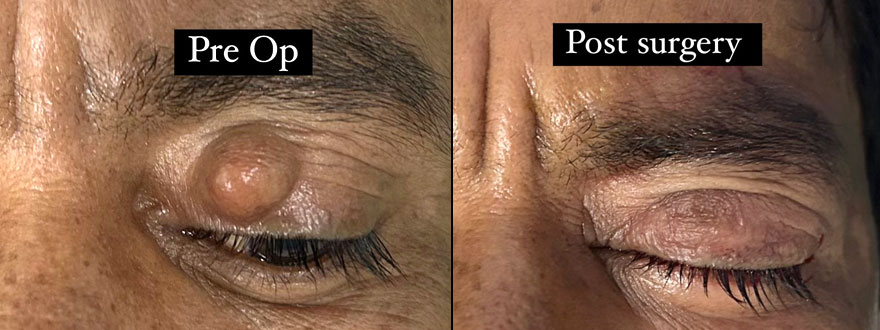Oculoplasty

Oculoplasty, also known as oculoplastic surgery, is a specialized branch of ophthalmology that focuses on the diagnosis and management of disorders affecting the eyelids, orbit (eye socket), tear ducts, and surrounding facial structures.
We are trained to perform both functional and cosmetic procedures to address a wide range of conditions.
Here's an overview of oculoplasty:
- Patient Evaluation & Diagnosis: Patients with eyelid or orbital disorders undergo a thorough evaluation to assess their symptoms, medical history, and ocular health. This may involve visual acuity testing, external examination of the eyelids and surrounding structures, assessment of eyelid position and function, and specialized imaging studies such as CT scans or MRI scans of the orbit.
- Classification & Subtypes: Oculoplastic conditions encompass a diverse array of disorders, including but not limited to:
- Eyelid Disorders: Ptosis (drooping eyelid), entropion (inward turning of the eyelid), ectropion (outward turning of the eyelid), eyelid tumors, eyelid malpositions, and eyelid lesions.
- Orbital Disorders: Orbital tumors, thyroid eye disease (Graves' disease), orbital fractures, orbital inflammations, and orbital vascular malformations.
- Lacrimal Disorders: Nasolacrimal duct obstruction, dacryocystitis (infection of the tear sac), lacrimal gland disorders, and congenital lacrimal anomalies.
- Cosmetic Oculoplasty: We also perform cosmetic procedures to enhance the appearance of the eyelids and periocular region. These may include upper and lower eyelid blepharoplasty to remove excess skin and fat.
- Long-term Management & Follow-up: Oculoplasty often involves long-term management and monitoring to assess treatment outcomes, ensure proper healing, and address any potential complications. Regular follow-up visits are essential for optimizing aesthetic results and functional outcomes.
By offering oculoplasty services, our aim is to improve both the function and appearance of the eyelids, orbit, and tear ducts, enhancing the overall well-being and quality of life for patients. This comprehensive approach to oculoplastic surgery involves meticulous evaluation, individualized treatment planning, and expert surgical techniques to achieve optimal outcomes.